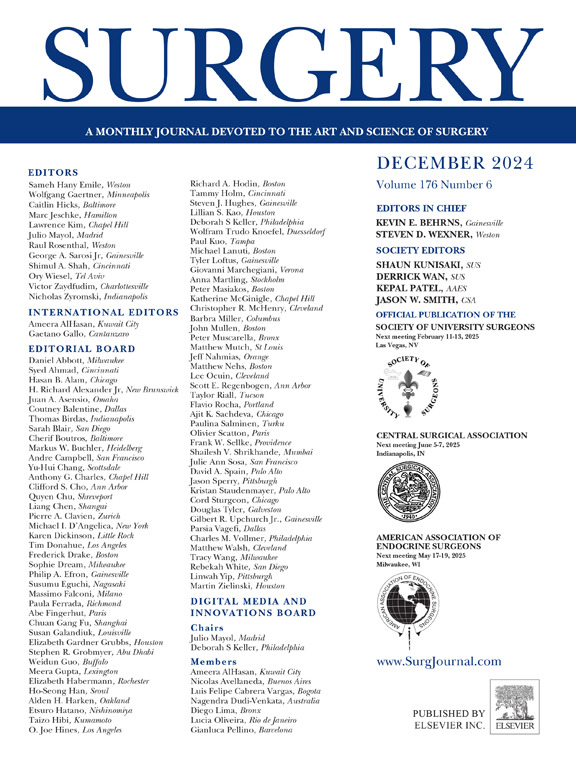Inequalities in quality metrics for colorectal cancer surgery in older adults: A retrospective cohort study using the American College of Surgeons National Surgical Quality Improvement Program registry
IF 2.7
2区 医学
Q1 SURGERY
引用次数: 0
Abstract
Background
With a growing proportion of patients undergoing surgery for colorectal cancer being older adults, it is unknown whether traditional quality metrics are achieved as often compared with younger adults. This work was done with a view to understand tailoring needs of quality metrics for older adults with colorectal cancer.
Methods
This retrospective cohort study used the American College of Surgeons National Surgical Quality Improvement Program registry to identify adults (≥18 years) between 2016 and 2021 who underwent elective colorectal cancer surgery for nonmetastatic cancer. older adults was defined as adults ≥65 years. The association between older adults and attainment of consensus quality metrics were evaluated using multivariable logistic regression adjusting for patient, cancer, and treatment factors.
Results
Of 46,159 patients undergoing elective colon cancer resection, 18,592 (40.3%) were older adults. Being an older adult was independently associated with a 14% reduction in odds of harvest of ≥12 nodes and 4.3 times increase in odds of 30-day mortality. Of 9,106 patients undergoing elective rectal cancer resection 5,143 (56.5%) were older adults. Being an older adult was independently associated with a 19% reduction in odds of harvest of ≥12 nodes, 2.3 times increase in odds of 30-day mortality and a 44% reduction in odds of receiving neoadjuvant radiation. Findings were robust to sensitivity analyses of alternate methods of handling missing data and alternate analytic approaches.
Conclusion
Given unique needs of the older adult population, interpretation of disparities in quality metrics is challenging because of an inability to differentiate between patient factors, tailored care, or bias. Monitoring and reporting of quality metrics for older adults need to be re-evaluated with consideration to stratification, unique benchmarks, and older adult–specific quality metrics.
老年人结直肠癌手术质量指标的不平等:利用美国外科学院国家外科质量改进计划登记处进行的一项回顾性队列研究。
背景:随着接受结直肠癌手术的患者中老年人所占比例越来越大,与年轻人相比,传统的质量指标是否能经常达到还不得而知。这项工作旨在了解老年人结直肠癌患者对质量指标的定制需求:这项回顾性队列研究利用美国外科医生学会国家外科质量改进计划登记册,对 2016 年至 2021 年间因非转移性癌症接受择期结直肠癌手术的成年人(≥18 岁)进行识别。使用多变量逻辑回归评估了老年人与达到共识质量指标之间的关系,并对患者、癌症和治疗因素进行了调整:结果:在接受择期结肠癌切除术的 46,159 名患者中,有 18,592 名(40.3%)是老年人。老年人与切除结节≥12个的几率降低14%和30天死亡率增加4.3倍密切相关。在9106名接受择期直肠癌切除术的患者中,有5143人(56.5%)是老年人。老年人与切除≥12个结节的几率降低19%、30天死亡率增加2.3倍以及接受新辅助放射治疗的几率降低44%有独立关联。研究结果对处理缺失数据的替代方法和替代分析方法的敏感性分析具有稳健性:鉴于老年人群的特殊需求,对质量指标差异的解释具有挑战性,因为无法区分患者因素、定制护理或偏见。对老年人质量指标的监测和报告需要重新评估,并考虑分层、独特的基准和老年人特定的质量指标。
本文章由计算机程序翻译,如有差异,请以英文原文为准。
求助全文
约1分钟内获得全文
求助全文
来源期刊

Surgery
医学-外科
CiteScore
5.40
自引率
5.30%
发文量
687
审稿时长
64 days
期刊介绍:
For 66 years, Surgery has published practical, authoritative information about procedures, clinical advances, and major trends shaping general surgery. Each issue features original scientific contributions and clinical reports. Peer-reviewed articles cover topics in oncology, trauma, gastrointestinal, vascular, and transplantation surgery. The journal also publishes papers from the meetings of its sponsoring societies, the Society of University Surgeons, the Central Surgical Association, and the American Association of Endocrine Surgeons.
 求助内容:
求助内容: 应助结果提醒方式:
应助结果提醒方式:


